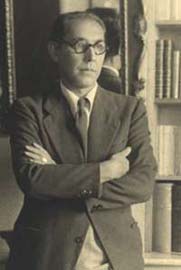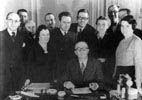
 |
|
|
|
| 1939 - 1945 | The
dark years |
From Cabinet to Resistance | |
| 1945 - 1965 | Life reconstructed | Radio and the comeback to the novel | |
| 1965 - 1985 | The calm years |
Pleasures of memories |
 |
The 1939-1940 turning point will see Beucler's first
and last official cohabitation with politics. He had never wanted to
be a part of any institution, yet how could he resist Jean Giraudoux
for whom he had never hidden his fascination. Jean Giraudoux, who was
not really part of the system, even if he did pursue the functions
of a civil servant.
Charge de mission in the Cabinet of the Commissariat a l'Information, he finds himself, yet again, amid friends: Louis Joxe, fellow-student at the Sorbonne, Rene Laporte, Andre Morize, Alexandre Guinle, Andre de Fels. He is in charge of special missions in Italy and Central Europe until the debacle. Once the Cabinet's archives are cleared to safety, he disappears for a time to the "free zone". In the South of France, together again with his ex-wife, they set up a structure for underground contact and shelter where numerous people transit: wanted Jews and franc-tireurs in liaison with Colonel Jean Vautrin, discreet and anonymous correspondants of Giraudoux and maquisards. One of the maquisards was his own brother, Serge; an escaped prisoner of war, member of the Secret Army, Serge was killed during a mine clearance in 1945! |
|
|
|
|
|
|
|
In
the aftermath of the war, Andre Beucler, who had never really recovered
from the brutal loss of his dearest friends: Leon-Paul Fargue, Jean
Giraudoux, Antoine de Saint-Exupery, Jean Prevost... devoted himself,
in his own particular way, to celebrating their remembrance.
In 1948, he had already given the first and some of the best pages ever written about the author of l'Apollon de Bellac (Jean Giraudoux). In 1952, with an amazing series of anecdotes and sketches, he had managed to tell the untellable when evoking Leon-Paul Fargue. Thanks to the pressure from many friends - Jean Paulhan, Jacques Audiberti, Blaise Cendrars, Roger Martin du Gard - he developed a taste for these literary portraits and the radio took advantage of this: in 1965, Andre Marissel on France-Culture devoted eight interviews to Andre Beucler, then Jean-Jose Marchand continued with a television project that, unfortunately, was never broadcast. Beucler himself produced two cycles of giralducian theatre with Louis Jouvet on French and Swiss radio. And then, driven by health needs and aided by nostalgia, Beucler retired to Nice in the Seventies, with his wife, married for the third time. Facing
the Baie des Anges, he willingly entertains the numerous visitors
attracted by the charm of his gift of fluency, his courtesy and
his recollections. |
|
|
|
|
| Edited
in his lifetime, Andre Beucler's work composes 42 volumes; 15 novels,
6 essays, 6 collections of portraits and memoirs. Included in his work are about fifty tales and short stories printed in the press, over a 1000 articles, chronicles and reports, the same number of radio broadcasts and he also participated in about ten films. Without forgetting numerous unpublished texts. Two books have been translated into English: The last of the Bohemians Twenty years with Léon-Paul Fargue with an Introduction by Archibald Mac Leich William Sloane Associates, Publishers 1954 New York Poet of Paris Twenty years with Léon-Paul Fargue Translated by Geoffrey Sainsbury Chatto & Windus 1955 London And the film "Ladykiller" (Gueule d'amour) |
|
|